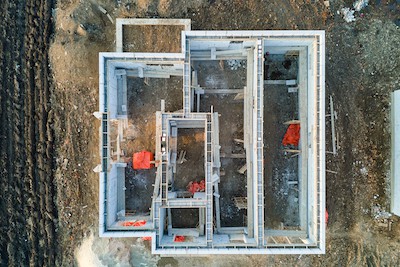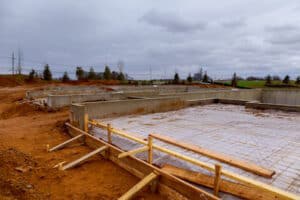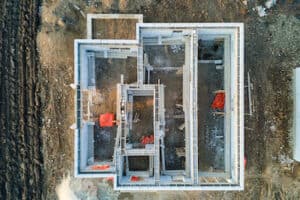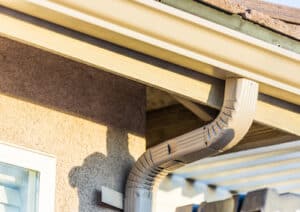
14 Feb What Should Homeowners Know About Their Foundation and Drainage?
What To Know About The Foundation And Drainage System On Your Home
As a homeowner, there are plenty of things you need to take care of for the longevity and value of your home. One of the most important things to know is how your foundation and drainage systems work together. It’s important to be aware of the condition of your home’s foundation and drainage. These are two key components of your home that can affect its overall stability and longevity. So in this article, we will go over the basics of what should homeowners know about their foundation and drainage.
- how your foundation functions
- the different types of home foundations
- signs your foundation needs repair
- how your drainage system works
- different types of drainage
- how to maintain your foundation and drainage
Read on to learn everything you should know about the foundation and drainage of your home!
The Importance Of A Foundation On Your Home
A home’s foundation is perhaps the most important element in its design and construction. Not only is it the literal foundation that the rest of the home rests on, but it helps to maintain a building’s general structural integrity, navigate variations in soil or moisture content and hold the entire edifice together. Without a quality foundation, homes may sink, crack, or become displaced – leading to costly repairs or even financial ruin. Homeowners should never try to save money by cutting back on their foundation; instead, it is essential to ensure that this important area of construction receives the highest quality materials and craftsmanship available.

The Different Types Of Home Foundations
Building a home begins with laying the foundation, and there are many to choose from. Poured concrete foundations, pile foundations, and block foundations are some of the common types used today.
- Poured concrete is an economical reliable option for most homes, requiring forms to be filled with a mixture of cement, aggregate, and water.
- Pile foundations use steel or reinforced concrete piles driven into the soil until reaching hard-bearing strata to distribute structural load and reduce settlement.
- Block foundation is a fast construction process of hollow cinder blocks made of pumice or lightweight aggregates that are impermeable to moisture.
Every home has different foundation requirements based on the building’s design plans and local building code standards so it’s best to consult a professional about which type of home foundation works for you. If you aren’t sure what kind of foundation your home has, you can usually find this information in the building plans or blueprints.
Signs Your Foundation Needs Repair
Homeowners should periodically inspect their foundations for signs of damage or wear. If your foundation appears to be sinking, settling, cracking, or bulging, then you may need to arrange for a home inspection by a qualified contractor. You can also check for leaks around windows and doors and for moisture buildup in your basement that could be caused by a compromised foundation. The age of your home is another factor that can help you determine whether a repair is necessary; if it’s been more than ten years since the foundation was built, it’s probably time to have a professional assess the condition of the structure. Taking quick action when signs of damage are detected not only saves money in the long run but can prevent even more serious complications.

The Importance Of Drainage On Your Home
Installing proper drainage around your home is essential for safeguarding against flooding and humidity. Homeowners should regularly inspect their drainage systems to make sure no maintenance is needed and that there are no obstructions caused by debris or dirt. If not properly cared for, your drainage system can develop a clog, which may cause water to pool in undesired spots near the house. Neglecting these conditions could lead to foundational issues that could be very costly to repair. Being proactive and taking the time to maintain properly functioning water flow systems will ensure a dry, secure environment for all.
Different Types Of Home Drainage Systems
One of the most important components of any home’s plumbing system is its drainage system, but there are a variety of different types to choose from.
- An efficient gravity drainage system typically runs on a downward slope and relies on the force of gravity so water flows away from the home.
- For properties located on a flat piece of land, pressurized drainage systems use pumps to create pressure so water drains resourcefully into pipes.
- For homes in low-lying areas with consistently high groundwater, sump pump systems can be used to redirect excess water away from the foundation, keeping it dry and protecting it against flooding or structural damage.
Homeowners should consult local professionals when deciding which type of drainage system is best for their property.

How To Properly Maintain Your Foundation And Drainage
Maintaining your foundation and drainage system is essential for keeping your home safe and stable. One of the first steps to ensuring a sound foundation and drainage system is to make sure you have proper gutters in place. Next, inspect them regularly for any clogs, overflowing, or structural damage that would impede their ability to properly redirect rainwater away from the foundation. Similarly, check for cracks, settling, or dampness around the foundation and make any needed repairs as soon as possible. Lastly, invest in professional gutter cleaning services every 6-12 months to ensure all debris is removed from the gutters so water can be redirected away from your home efficiently. Taking these proactive steps now will save you from costly repairs down the road!
The Bottom Line
A home’s foundation and drainage are arguably the most important parts of your house. Your foundation needs to be able to support the weight of the house, and it needs to be level in order for doors and windows to open and close properly. It also needs to be free of cracks and moisture in order for it to do its job. The drainage system is also critical as it prevents flooding, humidity, and water damage. Regularly inspect your home’s foundation and drainage system, perform any needed maintenance or repairs quickly, and talk with a local professional if you’re unsure how to proceed. Taking these steps will not only ensure your home is safe and secure, but it will also help to retain its value if you ever choose to sell. If you are ever unsure how to inspect your home’s foundation and drainage system, don’t hesitate to contact a professional home inspector for help. They will be able to answer all your questions and provide you with the information you need to know about your foundation and drainage.
Related Questions
How often should I inspect my home’s foundation?
You should inspect your home’s foundation at least once a year. Look for any signs of damage, including cracks or settling in the foundation, and make sure to address the issue promptly. Additionally, check for water pooling near the house and make sure gutters are properly installed and functioning so rainwater can be diverted away from the foundation.
What type of drainage system is best for my home?
The best type of drainage system depends on the land and location of your property. If your home is located on a flat piece of land, pressurized systems are usually recommended as they use pumps to create pressure that redirects water away from the house. For properties with consistently high groundwater levels, sump pumps are a good option. If you’re not sure which one is best for your home, consult with a professional home inspector. They’ll be able to make recommendations based on your specific needs.
Are there any DIY repair solutions for my foundation and drainage system?
It’s generally recommended that larger repairs to a foundation or drainage system be handled by a professional as they have the experience and tools needed to get the job done properly. However, smaller issues such as minor cracks or clogged gutters can often be addressed with DIY solutions. Make sure you understand what the issue is before attempting any repairs and take necessary safety precautions.




Sorry, the comment form is closed at this time.